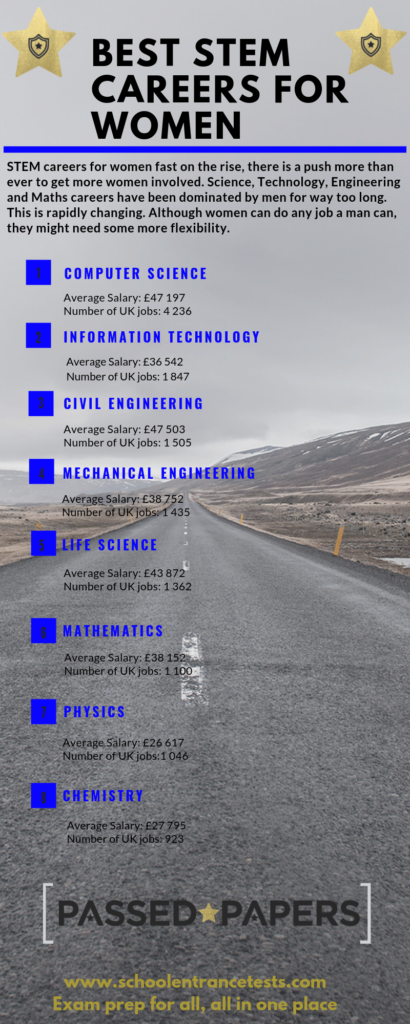Welcome to our STEM Career skills guidance counsellor’s tips.
Our expert STEM career guidance counsellor
is called Hannah.
Hannah likes to help students from different backgrounds and with varying abilities, in the State and the Independent sectors, reach decisions about education and careers and understand how strengths, interests and personality fit together to inform ideas about career routes.
She is registered with the Health and Care Professions Council and the Register of Career Development Professionals.
Hannah from Talent & Career is offering short Careers Guidance sessions, via Skype. Aimed at those students who have missed their guidance sessions because of the pandemic and also to any others who now have concerns about their plans in the light of there being no summer exams.
To book in please complete a contact form on Hannah’s website.
STEM Careers Guidance
The term ‘STEM’ originated in government as a useful acronym for a group of closely related subjects – Science, Technology, Engineering and Mathematics. Subjects which, it is argued, are of significant importance to the UK economy.
Across a range of STEM industries, including life sciences, chemical sciences, engineering and digital, 45 per cent of employers currently face difficulties recruiting staff with STEM skills, and 59 per cent expect difficulty in the next three years. Women, ethnic minority groups and those with additional support needs are also all under-represented in STEM-related roles.
Within schools there are a number of initiatives designed to engage students and teachers directly with hands-on events and activities, inspiring learners to develop an interest in STEM and supporting educators to better focus on STEM in the classroom.
Clearly, the most important factor influencing young people’s engagement and achievement in any subject is the quality of teaching. However, as new industries are emerging and many of the most important jobs of the future don’t yet exist, it’s vital that all young people get the highest quality career guidance. Experienced career development professionals will do this by working with young people and guiding them;
STEM career guidance
- Developing self-awareness and identifying strengths
- Providing information about opportunities and broadening horizons
- Developing decision-making skills
- Helping with transitioning
In this era of change, new technologies are being developed quickly and occupations are increasingly specialised. As parents, we may question our ability to support young people as they start out on their career paths. Now, more than ever it is necessary for us to support our children by helping children view their career options from a better angle. Therefore realising the possibilities of finding a fulfilling career.
Here’s how we still have an important role to play.
Helping children get valuable work experience
Young people today have a huge selection of career options to choose from. We may see this as a blessing, but they tend to feel overwhelmed and confused.

Be curious about your teen’s career ideas. What’s most important to them? Travel, challenging work, a high salary, people contact? Encourage your child to get experience through volunteering and help set up informational interviews or internships with people you know.
Helping children prepare for interviews
Never fill out applications for your child, and please don’t accompany them to a job interview (yes it does happen!). Your support is far more valuable in sharing knowledge such as appropriate interview attire, the importance of punctuality, and what kinds of questions to expect. Interview questions haven’t changed hugely over the years, but there are lots of online resources to guide you if you need them. Remember, hiring managers are likely to be closer to your age than theirs, so your ‘old fashioned’ perspective will be just what’s needed.
Sharing your experiences
You want to help your children to find work that is satisfying, and at the same time, you want them to realise that they will probably not find their ‘dream job’ immediately. After all, in most cases, they will start in an entry-level job. Being honest with them about the highs and lows you have experienced will help them develop a realistic career perspective. Even better, have them talk with your friends and work colleagues too, they’re more likely to believe them than you!
Popular STEM career routes
Encouraging them to think outside the box
Although many jobs that exist today will still be needed in the future, new technologies will create jobs that we find difficult to imagine today. Futurist Thomas Frey envisages roles such as Nano-Medics (who design health remedies on a microscopic scale), Memory Augmentation Therapists (much needed to help ageing populations get more out of life!) and Urban Agriculturists (growing food underground in cities). Young people who can envision novel and creative solutions are likely to be in high demand.

Remembering that an entrepreneurial attitude is key
As parents, we tend to focus on the importance of qualifications. But just like Darwin’s theory of evolution, the modern job market is about the survival of the fittest. Contract work and part-time work is increasingly prevalent, and a degree won’t be enough, only those with an entrepreneurial attitude will thrive. So encourage your teen to investigate their skills and strengths – what makes them stand out from the crowd?
Popular STEM career routes
3 Steps to Prepare Children for Future Jobs
The world is evolving and we all hear the words “digital”, “technology”, “edtech” and “STEAM” more each day. In this process of drastic changes, we are sure that the jobs of the future will not be the same as today. While it is expected that 40% of the current jobs will disappear in the following years, jobs focusing on STEAM will bear higher importance.
This introduces a new task for parents: getting their kids ready by motivating them for STEAM activities. Kids with the know-how of science, a sparkling curiosity, an urge to solve the world’s problems and limitless imagination will surely be the leaders of tomorrow. In this post, we have 3 steps as suggestions to contribute to your journey and prepare children for future jobs.
3 Steps to Prepare Children for Future Jobs
STEP 1: Let kids discover their own passions and find out their unique talents!
The best journey is surely the one you enjoy the most. For kids of Generation Z, it is much more important to have their own way of doing things. In order to get ready for their future jobs and career, they should focus on their own interests. If it is space, they should definitely get a telescope to their room. If it is nature, they should definitely go for trekking once a week. A passion-driven learning environment is key to both their success and happiness.
There are many apps and websites that can give your kids a headstart for their own journey.
STEP 2: Encourage kids to try, fail and learn with hands-on experiences!
Experiencing something is a hundred times better than reading about it to learn. For example, seeing a chemical blowing up due to gas released makes more impact on children’s minds than checking about it on Google. Thus, it is time to try, fail and learn!
Popular STEM career routes
STEP 3: Help them develop universal values!
The engineers who built the gas rooms or the guns were also the best engineers of that time. For a better future for all of us, it is not enough to know physics or science well. We should nurture our kids with universal values to deliver projects for the sake of the world.
STEM Career guidance
Good guidance helps inspire students towards further study and enables them to make informed decisions whenever choices are open to them.
In addition to effective personal guidance the Gatsby Charitable Foundation identified seven other “benchmarks”:
- Personal guidance
- A stable careers programme
- Learning from career and labour market information
- Addressing the needs of each student
- Linking curriculum learning to careers
- Encounters with employers and employees
- Experiences of workplaces
- Encounters with further and higher education
School Entrance Tests‘ promotion of STEM Careers for girls
There are a plethora of STEM networking opportunities for schools to link to both nationally and locally. Schools must build external relationships with providers of STEM career-related enhancement and enrichment activities. The STEM career gender ap is big and needs prioritising.
STEM careers for women fast on the rise, there is a push more than ever to get more women involved. Science, Technology, Engineering and Maths careers have been dominated by men for way too long. This is rapidly changing.
According to 2018 Workforce Statistics by the Wise campaign, over 900 000 women work in STEM occupations in the UK. Wise’s goal of 1 000 000 women by 2020 is therefore in close reach. However, with the year to year growth dropping below 5%, the push is on.

Events like Women in Data and Women in STEM help to get this message out. The Women in Data event has now become the biggest UK data event of its kind in the UK. With companies like Female Leads actively encouraging girls from a young age to become future leaders.
STEM Career Programmes
A key part of any STEM Careers programme is to bring together industry and education to provide high-quality careers education, information, advice and guidance for STEM subjects. Such work needs to comprise several strands, including a communication campaign, production of careers resources, and academic research.
For example, films introducing some of the exciting careers that students may access by studying STEM subjects.
* Climate Scientist * Sports Technologist * Spacecraft Engineer * Structural Engineer * Snowboard Designer * Radio Producer * Planetary Scientist * Marine Biologist * Lighting Designer * Games Developer * Food Technologist * Environmentalist * Energy Analyst * Digital Designer * Cosmetics Specialist*
Teachers and career professionals can build and use their networks to promote STEM career-related learning. Such networks can include those between school colleagues, or with parents, community governors, alumni and local employers.
STEM Careers Services for Schools
We offer any school the following Career Guidance options for their pupils;
- Firstly, one to one guidance.
- Secondly, group workshops.
- Thirdly, equine facilitated learning – (link to page).
- Strengths, interests and ability testing.
- Detailed personal profile reports and feedback.
- Ongoing support.
Choices and Next Steps
We know that young people need help in making decisions about education and careers. Thus, we encourage children to;
- Firstly, Choose the right subjects in school.
- Secondly, weigh-up university courses and alternatives to higher education.
- Thirdly, find out about career paths and achieving future goals.
- Identify key skills, strengths and interests.
- Learn how to develop Career Resilience.
- Receive detailed personal profile reports, feedback and action plans.
- Benefit from on-going support.
STEM careers have been a buzz word in the world of work for a while now. With STEM careers being seen as the highest paying positions of any field, the incentives are good. However, it is believed that only 23% of the overall UK STEM workforce are women. The gap is big and the opportunities abundant.
With STEM careers for both men and women rising, many schools and colleges are pushing more and more girls to take STEM-orientated GCSE subjects. According to 2018 Workforce Statistics by the Wise campaign, over 900 000 women work in STEM occupations in the UK. Wise’s goal of 1 000 000 women by 2020 is therefore in close reach.

Events like Women in Data and Women in STEM help to get this message out. The Women in Data event has now become the biggest UK data event of its kind in the UK. With companies like Female Leads actively encouraging girls from a young age to become future leaders. Stemettes.org, on the other hand, works hard to inspire young women into STEM careers. They not only provide events, workshops, exhibitions and mentoring but encourage girls to find women in STEM role models.
Women in tech
How organisations such as GCHQ are targeting girls for STEM careers
Intelligence service GCHQ and defence company BAE Systems are two organisations looking to get more women in tech.
The UK faces a nationwide skills shortage within the STEM (Science Technology Engineering Mathematics) community.
According to Engineering UK’s 2018 report, 203,000 people with engineering skills are required each year until 2024 to meet demand. However, there’s expected to be an annual shortfall of 59,000 engineering and technicians to fill these roles.

Even more alarming is the disparity between men and women when it comes to STEM careers. Just 12% of those working in engineering are female, claims Engineering UK and around 14% across STEM as a whole, according to WISE. This is well short of the country’s goal of a critical mass of 30%.
Maths teaching
So why is there such a difference between the sexes? And why do girls tend to drop STEM subjects at every decision point? One factor may be around exams.
Typically, girls do as well as or even outperform boys in STEM classwork. However, they tend to do worse on tests. The International Student Assessment (Pisa) reports on over a quarter of a million 15-year-olds from 40 countries who take identical tests in mathematics and reading. In 2015, it found the average difference between high-achieving boys and girls in Maths was 19 points. This is equivalent of about half a year at school.
However, these differences disappeared when factoring in reported levels of self-confidence or anxiety about Maths. On average, girls are more anxious about tests than boys. And this, in turn, seems to affect their score.
Cultural reasons could be a factor too, reckons Ann Watson, Chief Executive at Semta (Science Engineering, Mathematics, Technologies Alliance) – a not for profit organisation for improving engineering skills. She thinks young girls see engineering as a male world.
“If you have got a girl who is creative and likes solving problems, she wouldn’t necessarily think she could make a good engineer, but she absolutely could.”
Economic benefits
Research from Engineering UK shows 60% of girls aged 11 to 14 think they could become an engineer if they wanted to. This compares to 72% of boys. However, the figure drops to 53% between 16 to 19. And only a quarter of girls in this age group say they will consider a career in engineering.
Part of the problem may be that girls aren’t aware of the economic benefits of a STEM career, claims Natasha Stromberg, Founder of website Genderbuzz. “In Russia, girls are helped into STEM subjects because they lead to well-paid jobs,” she says. “We need young girls to think about their economic empowerment and sell them the financial benefits of engineering jobs.”
Nevertheless, things are beginning to change. In order to address to bridge this gender gap, many organisations and companies are now actively targeting girls for STEM careers. Here we look at two of them: GCHQ and BAE Systems.
CyberFirst Girls
National intelligence service GCHQ already offers a range of courses, competitions and student bursaries for 11-to-17-year-olds. These are run by the National Cyber Security Centre (NCSC). However, it recently launched a new competition aimed exclusively at girls. This is as part of its plans to reduce the gender skills gap.
Targeted at girls aged 12 and 13, CyberFirst Girls sees teams of up to four girls taking part in a series of online challenges. These are split into four categories: cryptography, cybersecurity, logic & coding and networking. The top 10 teams will then move on to a face-to-face grand final in Edinburgh in March.
According to Chris Ensor, the NCSC deputy director for skills and growth, participation in its cybersecurity skills programmes has risen 300% since its launch in 2016: “Trebling the number of young people taking part on CyberFirst courses is an encouraging start,” he says. “However women only make a small proportion of the global cyber workforce – throughout GCHQ and the NCSC we are looking to address the imbalance.”
Currently, only 11% of the global cyber workforce is female, claims NCSC. This is roughly the same across the engineering sector as a whole.
BAE Systems
Nor is GCHQ the only organisation hoping to get more women into STEM careers. Defence company BAE Systems sets targets for the number of women it employs. These include 30% female graduates and 20% female apprenticeships.
It also has a programme across 420 schools, covering 90,000 pupils, to help find more budding female engineers. “Women going out into local schools to talk about their careers is having a huge impact on the number of girls applying for apprenticeships,” says John Whelan, Human Resources director, programmes and support, BAE Systems.
Indeed with more female role models in STEM as well as initiatives such as Ada Lovelace Day, it’s hoped that the gender gap can be reduced in the next few years. Only by doing this can we begin to address the demand for future jobs.
What are STEM Careers?
STEM careers refer to jobs in Science, Technology, Engineering and Maths.
STEM careers have been a buzz word in the world of work for a while now. With STEM careers being seen as the highest paying positions of any field, the incentives are good. However, it is believed that only 23% of the overall UK STEM workforce are women. The gap is big and the opportunities abundant.
With STEM careers for both men and women rising, many schools and colleges are pushing more and more girls to take STEM-orientated GCSE subjects. According to 2018 Workforce Statistics by the Wise campaign, over 900 000 women work in STEM occupations in the UK. Wise’s goal of 1 000 000 women by 2020 is therefore in close reach.
Events like Women in Data and Women in STEM help to get this message out. The Women in Data event has now become the biggest UK data event of its kind in the UK. With companies like Female Leads actively encouraging girls from a young age to become future leaders. Stemettes.org, on the other hand, works hard to inspire young women into STEM careers. They not only provide events, workshops, exhibitions and mentoring but encourage girls to find women in STEM role models.
So what careers are at the top of the list for aspiring female scientists and engineers?
Which STEM Careers offer the highest salaries?
As Benjamin Franklin so famously said: “To fail to plan is to plan to fail”. This applies to career guidance too. To realise the end goal – what are the options out there and what education do you need. As mentioned in our article, Future STEM Jobs, we are educating our children for careers that we might not even be aware of. Therefore looking at STEM, it is can provide security. Most future jobs would most likely be based in STEM. Here are some of the highest paying STEM careers for women (and men) to study for now, according to a study done by ADZUNA in 2018.
1. Aeronautical Engineer
Average Salary: £51 448
Number of UK jobs: 26
2. Civil Engineer
Average Salary: £47 503
Number of UK jobs: 1 505
3. Computer Science
Average Salary: £47 197
Number of UK jobs: 4 236
4. Chemical Engineer
Average Salary: £45 527
Number of UK jobs: 194
5. Life Science
Average Salary: £43 872
Number of UK jobs: 1 362
6. Statistics
Average Salary: £43 731
Number of UK jobs: 438
7. Electrical Engineering
Average Salary: £43 412
Number of UK jobs: 831
8. Pharmacy
Average Salary: £42 984
Number of UK jobs: 407
9. Mechanical Engineering
Average Salary: £38 752
Number of UK jobs: 1 432
10. Mathematics
Average Salary: £38 125
Number of UK jobs: 1 100
According to this study, technology graduates have the most opportunities. However, even though Engineering and IT topped the list, there is no reason to drop Maths and Sciences.
Best STEM careers opportunities for female students

The above lists should give you a good indication as to which STEM careers are both the highest paying and have the most opportunities.
You will find various STEM careers listed below. For an overview on becoming qualified in one of these careers listed, follow the associated link.
Other STEM Career Advice
- Making the right CSE choices
- GCSE Options Guest Blog – from our Pupil Pulpit
With the current skills shortage in these careers, a lot of emphasis is put on the training and education in Maths and related subjects. Our blog on Women in Tech specifically looks at how to get girls more involved in this field. According to this article on the Skills Shortage, the cost to the STEM sector is £1.5 bn. It is estimated that new STEM jobs will double in the next 10 years. With a reported 89% of STEM businesses currently struggling to recruit, the pressure is on.
Joining a STEM society is a great way to connect to your chosen profession and it looks impressive on your CV. It might also help you acquire those core competency skills needed.
There is no doubt that these careers are in demand and will be more so in the future. As these careers mostly involve tertiary education, it is important to know the requirements and necessary subject choices needed to follow your chosen direction. Join or start a STEM club at your school and connect to a world of information.
A rise in non-tech jobs
The rise in tech jobs and the growth in tech companies have brought on the inevitable growth of non-tech jobs within tech companies. A recent article on research done by Glassdoor shows the rise in non-tech jobs quite clearly.
Some of the key findings from this research:
- As tech companies grow, so does the need for operations managers, marketing, sales, finance etc.
- Over half of the job vacancies at tech companies are for non-tech roles (54%).
- The five most in-demand non-tech jobs are an account manager, operations manager, account executive and marketing manager.
- The five most in-demand tech jobs are a software engineer, product manager, software development engineer, solutions architect and web developer.
- According to this research, the average median salary for tech jobs at tech companies in the UK is £40 400 and for non-tech jobs, it is £38 100.
Career Guides for Schools
Careers Guidance is particularly valuable at these key stages:
- Which GCSE options to choose? (During Y9)
- What sort of Level 3 qualification to take – A level, Level 3 BTEC, Apprenticeship, T levels (Years 10 and Y11).
- Where to go after Level 3 – University, Apprenticeship, Work, (Year 12).
- After graduation.
Also, keep an eye on our careers blog page for a more detailed look at different top jobs in the UK.
